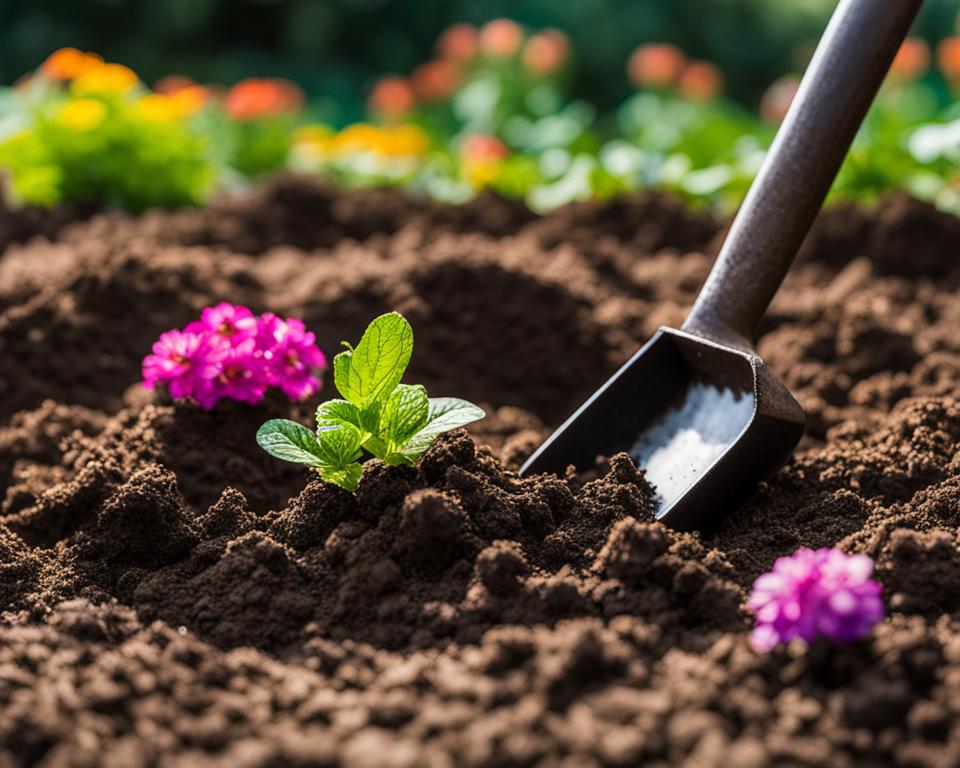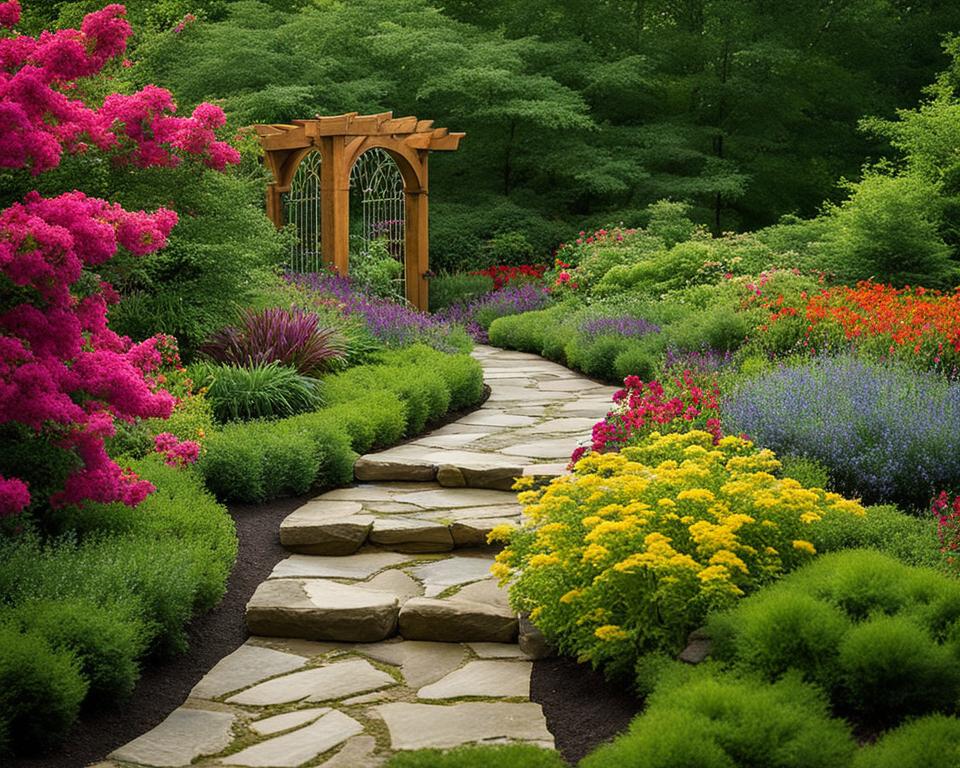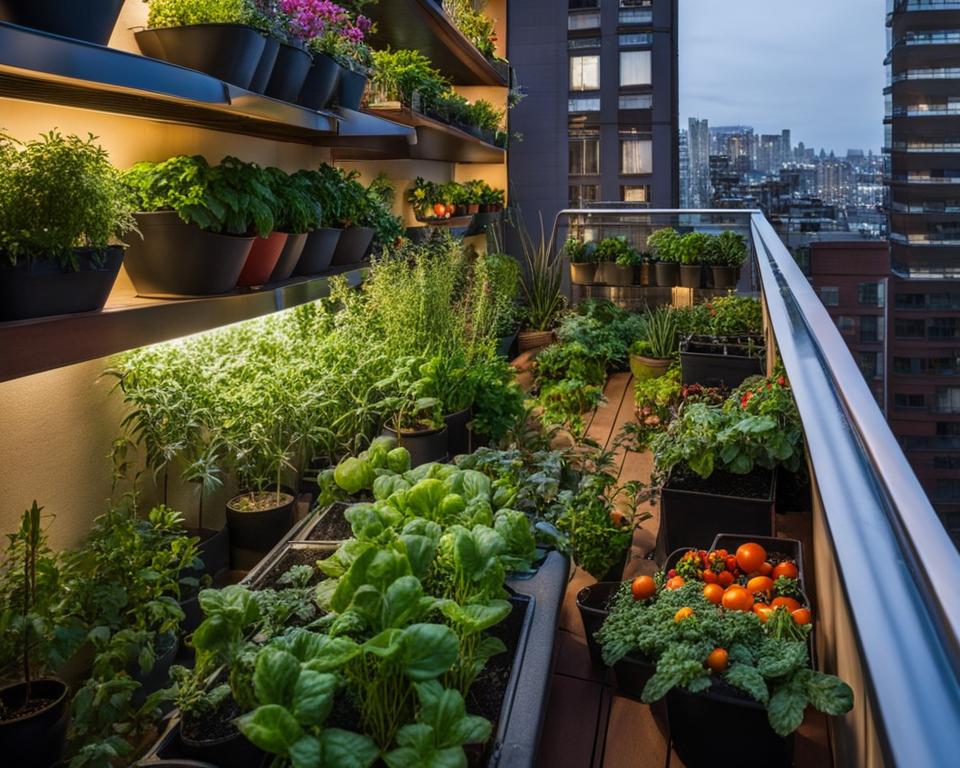Urban gardening is a popular trend that allows city dwellers to create their own green spaces and connect with nature. With these urban gardening tips and tricks, you can transform your concrete jungle into a lush oasis. From choosing the right plants for small spaces to maximizing container gardening, we’ve gathered the best advice from experts to help you succeed in your urban gardening endeavors.
Key Takeaways:
- Choose plants that are suitable for small spaces
- Maximize container gardening
- Utilize vertical gardening techniques
- Consider using raised beds for limited space
- Experiment with creative planting solutions
Understanding Atlanta’s Planting Zones
Atlanta, Georgia has a diverse and unique gardening climate. To ensure successful gardening in the area, it is important to understand Atlanta’s planting zones as determined by the USDA Hardiness Zone Map. Atlanta falls within Zone 7b, which means it experiences minimum temperatures as low as 5°F (-15°C).
Knowing your planting zone is crucial for selecting the right plants that can thrive year-round in Atlanta’s climate. The USDA Hardiness Zone Map provides valuable information about the average minimum winter temperatures in different regions, helping gardeners make informed decisions about plant selection.
USDA Hardiness Zone Map
The USDA Hardiness Zone Map divides North America into 13 different zones based on the average annual minimum winter temperatures. Each zone is further divided into two subzones, indicated by the letters ‘a’ and ‘b’, which represent a 5°F difference in minimum temperatures.
The USDA Hardiness Zone Map is a valuable tool for gardeners as it provides guidance on which plants are most likely to thrive based on the average minimum temperatures of the region.
Understanding Atlanta’s planting zones will help you select plants that can withstand the city’s temperature extremes. It is important to choose plants that are suitable for Zone 7b, ensuring they can tolerate both the hot summers and mild winters of Atlanta. By selecting plants that are well-suited to your planting zone, you can create a thriving garden that can withstand the unique challenges of Atlanta’s climate.
Tips for Gardening in Atlanta’s Climate
Gardening in Atlanta can be a rewarding experience, but it also comes with its own set of challenges. The city’s humid subtropical climate, characterized by hot and humid summers and mild winters, requires careful consideration when planning and maintaining your garden. Here are some tips to help you navigate Atlanta’s unique gardening climate:
- Choose plants that can tolerate temperature fluctuations: Atlanta’s climate can vary greatly throughout the year, with temperatures ranging from sweltering heat to occasional winter frost. Opt for plants that can withstand these extremes and are well-suited to the region’s USDA Hardiness Zone 7b. This includes varieties like sunflowers, zinnias, and herbs like rosemary and thyme.
- Amend your clay-based soil: Atlanta’s soil is predominantly clay-based, which can be dense and poorly draining. To improve soil structure and drainage, incorporate organic matter such as compost or well-rotted manure. This will help create a healthier growing environment for your plants, allowing their roots to access nutrients and water more easily.
- Provide adequate water and mulch: With hot summers and occasional dry spells, proper irrigation is essential for the health of your garden. Water deeply and infrequently to encourage deep root growth, and consider using drip irrigation systems to minimize water wastage. Additionally, apply a layer of organic mulch around your plants to conserve moisture, suppress weeds, and regulate soil temperature.
By following these tips, you can overcome the challenges posed by Atlanta’s climate and create a thriving garden that will bring beauty and enjoyment year-round. Remember to stay vigilant in monitoring your plants’ needs and make adjustments as necessary to ensure their success. Happy gardening!
Best Plants for Atlanta’s Planting Zones
When it comes to creating a beautiful and thriving garden in Atlanta, choosing the right plants for your specific planting zone is crucial. Native plants are the ideal choice, as they are well-adapted to the local climate and require less water and maintenance. Here are some of the best plants for Atlanta’s planting zones:
Atlanta Native Plants:
- Azaleas: These vibrant flowering shrubs are a staple in Atlanta gardens, adding a burst of color in the spring.
- Black-eyed Susans: These cheerful flowers bloom throughout the summer and are known for their bright yellow petals with dark centers.
- Dogwoods: Known for their iconic white or pink flowers, dogwoods are a popular choice for Atlanta gardens.
- Oakleaf Hydrangeas: These stunning shrubs feature large clusters of white flowers and boast beautiful autumn foliage.
Atlanta Shrubs:
Aside from the native plants mentioned above, Atlanta gardens also benefit from the inclusion of various shrubs. Boxwood is a popular choice, known for its dense foliage and versatility in shaping. Nandina is another great option, offering year-round interest with its vibrant foliage and bright berries.
Atlanta Trees:
Adding trees to your Atlanta garden can provide shade, privacy, and a touch of natural beauty. Consider planting cypress trees, known for their striking appearance and ability to thrive in Atlanta’s climate. Magnolia trees are also a favorite choice, offering stunning large flowers and glossy evergreen leaves.
Atlanta Flowers:
To add bursts of color and fragrance to your Atlanta garden, consider planting annuals and perennials. Begonias are a popular choice, known for their vibrant blooms and ability to thrive in shade. Impatiens are another great option, offering colorful flowers that attract butterflies and hummingbirds.
By selecting these native plants, shrubs, trees, and flowers, you can create a stunning and sustainable garden that thrives in Atlanta’s unique planting zones.
Seasonal Planting and Soil Preparation in Atlanta
When it comes to gardening in Atlanta, understanding the importance of seasonal planting and soil preparation is essential for a successful garden. By following the Atlanta gardening calendar and taking steps to prepare your soil, you can create an optimal environment for your plants to thrive.
Atlanta experiences distinct seasons, and planting at the right time is crucial for the health and growth of your garden. In the early spring, you can start planting warm-weather crops like tomatoes and peppers. As the summer heat arrives, it’s time to focus on maintaining your garden and ensuring adequate watering to beat the scorching temperatures.
In late summer, as the weather begins to cool down, you can transition to planting cool-weather crops like potatoes and lettuce. This allows you to make the most of the milder temperatures and ensure a bountiful harvest. By following the Atlanta gardening calendar, you can stay on track and maximize the productivity of your garden throughout the year.
Alongside seasonal planting, soil preparation is a crucial step in ensuring the success of your Atlanta garden. Testing the pH level of your soil and making necessary adjustments can help create an optimal environment for your plants. Additionally, amending the soil with organic matter, such as compost, will improve its structure and drainage.

Essential Tips for Atlanta Garden Soil Preparation:
- Test the pH level of your soil using a simple soil testing kit. Adjust the pH if needed by adding lime to raise the pH or sulfur to lower it.
- Add organic matter, such as compost or well-rotted manure, to improve soil structure and drainage.
- Consider using raised beds or containers if your soil quality is poor or if you have limited gardening space.
- Apply a layer of mulch around your plants to help retain moisture and suppress weed growth.
By following these tips and preparing your soil appropriately, you’ll create a foundation for healthy plant growth and a thriving Atlanta garden. Remember to follow the Atlanta gardening calendar and adjust your planting schedule accordingly to make the most of the city’s unique climate.
Maintaining and Caring for Your Atlanta Garden
Once your Atlanta garden is established, proper maintenance is crucial for its continued success. Here are some tips to help you maintain and care for your garden:
- Watering: Water deeply and regularly, especially during dry spells, to ensure your plants receive adequate hydration.
- Pruning and Fertilizing: Regular pruning and fertilizing will promote healthy growth and blooming. Trim back any dead or overgrown branches to maintain the plant’s shape and remove any weeds or unwanted plants that may compete for nutrients.
- Pest and Disease Control: Pay attention to pest and disease control, as the humid climate of Atlanta can be a breeding ground for garden pests. Monitor your plants regularly for signs of pests or diseases, and take prompt action to address any issues. Use natural and eco-friendly pest control methods whenever possible.
- Seasonal Maintenance: Different seasons require different maintenance tasks. In the spring, clean up any debris, remove winter protection, and prepare the soil for planting. In the fall, remove any spent plants, add compost or mulch to the soil, and protect delicate plants from frost.
By following these maintenance practices, you can ensure the health and vitality of your Atlanta garden throughout the year. Remember to also enjoy the beauty and serenity of your garden space, as it provides a peaceful sanctuary in the midst of the city.
Expert Tip:
“Regular maintenance is key to a successful Atlanta garden. By staying proactive and addressing any issues promptly, you can prevent them from spreading and causing harm to your plants. Don’t forget to take some time to observe and appreciate the beauty of your garden, as it is a testament to your hard work and dedication.” – Jenna Mitchell, Master Gardener
Designing an Impressive Entrance with Your Atlanta Garden
Your Atlanta garden is not only a place to enjoy nature but also an opportunity to enhance the curb appeal and create a beautiful entrance for your home. By incorporating thoughtful design elements and careful plant selection, you can transform your front yard into a stunning outdoor space that welcomes both residents and visitors alike.

When designing your Atlanta garden, consider incorporating vibrant colors through a variety of flowers and plants. Choose species that thrive in Atlanta’s climate, such as vibrant azaleas, fragrant magnolias, or colorful black-eyed Susans. By strategically placing these plants throughout your front yard, you can create eye-catching displays of color that will leave a lasting impression on anyone passing by.
In addition to selecting the right plants, consider incorporating hardscaping elements like pathways and patios to add structure and functionality to your Atlanta garden. Stone or brick pathways can guide visitors through your garden while adding visual interest. A well-placed patio provides a space for outdoor seating or entertaining, making your front yard more versatile.
Attention to Detail
Paying attention to small details can make a big difference in the overall look of your Atlanta garden. Consider adding decorative elements such as garden art, ornamental fences, or trellises to create focal points and add visual interest. Lighting plays a crucial role in highlighting your garden’s features, so invest in outdoor lighting fixtures that showcase your plants and pathways, and create a warm and inviting ambiance during the evening hours.
- Add pops of color with hanging baskets or window boxes filled with seasonal flowers
- Use mulch or decorative rocks to define garden beds and pathways
- Consider incorporating water features like a small fountain or birdbath for a calming effect
- Use containers or raised beds to add dimension and make gardening more accessible
By paying attention to these design elements and adding your own personal touch, you can create an impressive entrance with your Atlanta garden that reflects your style and enhances the overall curb appeal of your home. Your front yard will become a welcoming oasis that sets the tone for your entire property and brings joy to both yourself and others.
Advanced Tips for a Sustainable Atlanta Garden
Gardening in Atlanta is not just about creating a beautiful outdoor space; it’s also an opportunity to make a positive impact on the environment. By implementing sustainable gardening practices, you can reduce your carbon footprint and create a garden that thrives in harmony with nature. Here are some advanced tips to help you create a sustainable Atlanta garden:
1. Enrich your soil with organic matter
One of the key foundations of sustainable gardening is healthy soil. Enrich your soil with organic matter such as compost, leaf mulch, or aged manure. This helps improve soil structure and drainage, promotes beneficial microbial activity, and reduces the need for synthetic fertilizers.
2. Practice water conservation
In Atlanta’s hot and humid climate, water conservation is essential. Install a drip irrigation system to deliver water directly to the roots of your plants, minimizing evaporation. Mulch around your plants to retain moisture and suppress weeds. Collect rainwater in barrels to use for irrigation, reducing reliance on municipal water sources.
3. Embrace natural pest control methods
Avoid using harsh chemicals that harm beneficial insects and pollinators. Instead, employ natural pest control methods such as hand-picking pests, using insecticidal soap or neem oil, and attracting beneficial insects like ladybugs and lacewings. Companion planting is also a great way to deter pests, as certain plants can repel or confuse them.
“Sustainable gardening in Atlanta is about working with nature, not against it. By implementing these advanced tips, you can create a garden that not only looks beautiful but also contributes to a healthier planet.”
Remember, sustainable gardening is a journey that requires ongoing learning and adaptation. Stay informed about eco-friendly gardening practices and continue to explore new ways to minimize your environmental impact. By practicing sustainable gardening in Atlanta, you can enjoy a thriving garden that benefits both you and the planet.
Conclusion
Urban gardening in Atlanta presents a unique opportunity to transform your urban space into a thriving garden oasis. By following the expert tips and tricks provided throughout this article, you can overcome the challenges and achieve urban gardening success.
Understanding Atlanta’s planting zones is key to selecting the right plants for your garden. With a humid subtropical climate, it’s important to choose plants that can withstand the temperature fluctuations and thrive in the local environment. Native plants, such as azaleas and dogwoods, are well-adapted to Atlanta’s planting zones and require less water and maintenance.
Maintaining your Atlanta garden is crucial for its continued success. Proper watering, regular pruning, and pest control are all important aspects of garden care. By addressing any issues promptly, you can prevent them from spreading and harming your plants.
Creating a sustainable and environmentally friendly garden is not only beneficial for the planet but also for your garden’s long-term health. Enriching the soil with organic matter, conserving water through drip irrigation, and using natural pest control methods are sustainable gardening practices suited for Atlanta’s climate.
With the right knowledge and techniques, you can turn your Atlanta urban space into a beautiful and functional garden. So get out there, get your hands dirty, and enjoy the rewards of urban gardening success!
FAQ
What is urban gardening?
Urban gardening is a popular trend that allows city dwellers to create their own green spaces and connect with nature.
What are the planting zones in Atlanta?
Atlanta falls within Zone 7b, as determined by the USDA Hardiness Zone Map.
What is the climate like in Atlanta?
Atlanta experiences a humid subtropical climate with hot, humid summers and mild winters.
What challenges do gardeners face in Atlanta?
The soil in Atlanta is mostly clay-based, which can pose challenges for gardeners. Additionally, extreme temperature fluctuations must be considered when selecting plants.
Which plants are native to Atlanta?
Some popular native plants for Atlanta’s planting zones include azaleas, black-eyed Susans, dogwoods, oakleaf hydrangeas, boxwood, nandina, cypress, magnolia, begonias, and impatiens.
When should I plant in Atlanta?
Plant warm-weather crops like tomatoes and peppers in early spring, and cool-weather crops like potatoes and lettuce in late summer.
How should I care for my Atlanta garden?
Water deeply and regularly, prune and fertilize regularly, address pest and disease control promptly.
How can I design an impressive entrance with my Atlanta garden?
Incorporate vibrant colors, choose the right plants for your area, and incorporate hardscaping elements like pathways and patios.
How can I create a sustainable Atlanta garden?
Enrich the soil with organic matter, practice water conservation through drip irrigation and mulching, use natural pest control methods, choose native plants, and incorporate companion planting.

